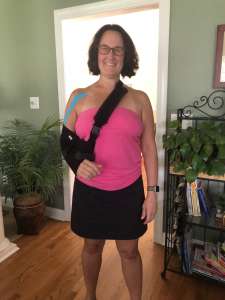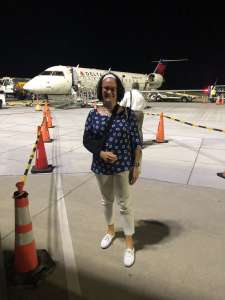Something as simple as rotator cuff surgery was enough to open my eyes on how different accessibility looks when you have a disability, even if it’s just temporary.
You know how you don’t realize just how much you rely on a specific body part until it’s not working the way it’s supposed to? The able-bodied blithely move through the world — and the convention center — blissfully unaware of how far the handicapped elevator is from the session rooms, how impossible it is to reach the food on the buffet from a scooter, and what it’s like to not have a table available that can accommodate a wheelchair. After all, the world is designed for the able-bodied, and until that body is hit with some form of disability, be it temporary or permanent, it’s easy to just not see how difficult something seemingly simple can become.
 I got a tutorial in this particular life lesson this summer when I had to have surgery to repair my rotator cuff, which left me temporarily without the use of my right shoulder, arm, and hand. Just living as a temporary leftie in a right-handed world was an eye opener — I practically had to do the cha-cha just to open the front door to my parents’ house. I was lucky to have my parents be there to make my meals, cut my food, and drive me to my physical therapy sessions during my time of need. Early on, I skipped a trip to a conference in Denver because I just couldn’t do the basics I would need to do on my own, from putting my suitcase in the overhead bin to washing my hair and dressing myself, without paying extra from someone to come with me to assist (sorry, Mom!).
I got a tutorial in this particular life lesson this summer when I had to have surgery to repair my rotator cuff, which left me temporarily without the use of my right shoulder, arm, and hand. Just living as a temporary leftie in a right-handed world was an eye opener — I practically had to do the cha-cha just to open the front door to my parents’ house. I was lucky to have my parents be there to make my meals, cut my food, and drive me to my physical therapy sessions during my time of need. Early on, I skipped a trip to a conference in Denver because I just couldn’t do the basics I would need to do on my own, from putting my suitcase in the overhead bin to washing my hair and dressing myself, without paying extra from someone to come with me to assist (sorry, Mom!).
However, after I was given the OK to travel six weeks post-surgery, I have been on the road pretty much non-stop. I still have to ask for help to put my suitcase in the overhead bin since I am not supposed to lift anything heavy for another month. I usually wear my sling, even though I don’t really need it — I still need help, but if my injury (or other disability) isn’t visible, I don’t want to look like I’m faking it.
 The experience of traveling and going to meetings while experiencing a temporary disability has made me think more deeply about what we do to ensure our events are as diverse and inclusive as they could, and should, be. I have so many questions, such as:
The experience of traveling and going to meetings while experiencing a temporary disability has made me think more deeply about what we do to ensure our events are as diverse and inclusive as they could, and should, be. I have so many questions, such as:
- How could an attendee without use of her dominant hand keep up with note-taking during a session? Would the onus be on her to find a solution, such as using a phone dictation app? Would it be up to her or the conference organizer to coordinate with the speaker to use a wireless Bluetooth mic that would enable her to transcribe her notes?
- How accessible is the food and beverage? It’s hard enough to juggle drinks, napkins and silverware while trying to fill a plate at a buffet when you have two hands — it’s impossible with one.
- If an attendee can’t cut the food into bite-sized portions once it’s on the plate, is there someone who can do that for them without making them feel embarrassed or condescended to?
- Is there sufficient space between tables to allow someone in a wheelchair or scooter to maneuver around them? Are there tables that can accommodate wheelchairs? And if so, is it isolated from where everyone else is sitting, set aside only for use by those in wheelchairs or scooters?
- Are entry and exit points clearly marked and accessible for those using a wheelchair, scooter, or crutches?
I also discovered just how awkward it can be to ask for help. While I don’t have a problem asking a stranger to cut up my food for me, I can imagine how hard that could be for someone who’s more self-conscious. But, as I learned when I worked at the Vancouver 2010 Paralympic Games, it’s also not OK to just assume someone in a wheelchair wants you to push their chair or needs your help. The person with the disability needs to be able to ask for help when they need it.
Also, disabilities, temporary or otherwise, can crop up at any time. So, while you may ask on your registration form if the attendee has any special requirements that need to be accommodated on site in the initial registration system, the answer may change in the days, weeks, and months leading up to your event. I would include verbiage on the registration form itself, and in follow-up emails and in the event app, to inform a specific person on your staff if something does change and that attendee will now need assistance at the event.
Do you have a disability — impairment, restriction, or limitation — and regularly attend conferences? I’d love to hear your thoughts on some of the sticking points that, while they make conference-going difficult for you, may not even be on the radar screen for able-bodied meeting organizers.



